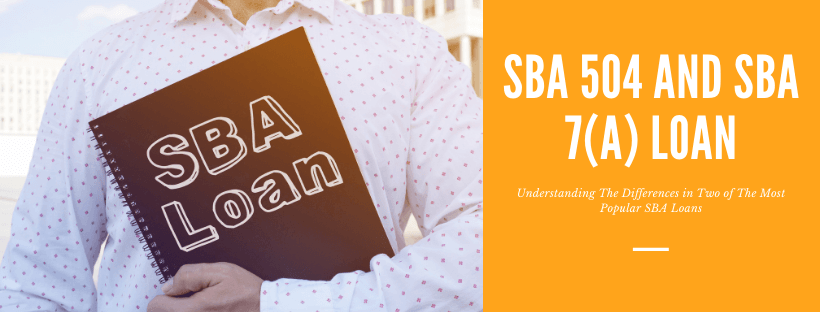The Difference in SBA 504 Commercial Real Estate Loan and SBA 7(A) Loans

If you need a loan to invest in growing your small business, it is good to have options—and you do. For example, the U.S. Small Business Administration (SBA) offers its SBA 504 loan and its SBA 7(a) loan. Both have advantages.
But to benefit, you must choose the right loan for your project, your financial circumstances, and your timeframe. Let’s look first at the broadest differences between these two types of loans.
SBA 504 versus SBA 7(a)
The SBA 504 commercial real estate loan (also called the Certified Development Company program) is intended to help you finance the purchase of fixed assets, usually real estate—buildings and heavy machinery—at below-market rates. SBA 504 distributes the loan among three parties: you (a minimum of 10 percent), a bank (50 percent), and the nonprofit Certified Development Company (CDC) (40 percent). CDCs were set up to support economic growth; there are several hundred nationwide. SBA 504 essentially a loan for the purchase of facilities. The loan can be as much as $20.0 million or more.
The SBA 7a Commercial Real Estate loan also comes under an SBA program to provide financial assistance to small businesses. It is intended to help you invest in expansion or renovation, the addition of new facilities, purchase of equipment or fixtures, or to use as working capital or for inventory growth. This is essentially a loan for working capital. This loan can be as much as $5.0 million
Answer a few questions and get custom mortgage quotes. We'll match you with offers from our network of 650+ lenders.
Comparing the terms
Let us look at a few terms and details of each choice.
Your SBA 504 for commercial real estate and major equipment is for a minimum of $125,000 up to a maximum of $20 million or more. This is the kind of money you require for your business’s new facility, a fleet of trucks, or heavy equipment to begin a construction firm.
This loan has a fixed interest rate for 20 or 25 years for real estate and 10 years for equipment. You put up 10 percent of the amount borrowed.
Your SBA 7(a) loan for more general purposes such as working capital and inventory is for a minimum of $50,000 up to a limit of $5.0 million. It usually has a variable interest rate and the period of the loan will vary with the intended purpose: up to 25 years for certain investments in real estate, 10 years for buying a business or equipment, and less for use as working capital. And you the borrower must put up at least 10 percent of the loan but usually more.
How you qualify for each loan
And now, a few differences in how you must qualify for the two different loans. In both cases, you must be a small business, but the size differs for the two types of loans.
The SBA 504 loan requires that your business’s net worth not exceed $15 million. Your average net profit after taxes for each of two years cannot have exceeded $5.0 million.
The SBA 7(a) loan depends upon industry type, but annual sales must not be outside a range of $750,000 to $33.5 million for retail, service, and agricultural small businesses. For this type of loan, your number of employees must be within the range of 100 to 1000 for wholesale and manufacturing.
Comparing how you will use the loan
Some other qualifications relate to the use that you, as owner of the business, will make of the new or upgraded or renovated building.
An SBA 504 loan requires that you, the owner, will occupy at least 51 percent of the building (more than half). If your loan is for equipment, that equipment must have a 10-year useful life. Generally, any of these assets will serve as collateral for the loan.
An SBA 7(a) loan requires that you, the owner, will occupy at least 51 percent of the building if it is an existing building that has been upgraded or renovated, and at least 60 percent if the loan supports new construction. In addition, any assets must be for the direct benefit of your business. Usually, your residence will be pledged for the loan unless the bank can show this is not necessary.
Comparing the fees will you pay
A final important difference between the two types of loan are the related fees.
For your SBA 504 loan, remember, there are three parties: you, a bank, and the CDC in your region. The fee payable to the CDC will be financed by the loan itself. You will negotiate the fee for the 50 percent of the loan provided by the bank. There also is a servicing fee for the SBA and a legal review fee.
For your SBA 7(a) loan, the fees can be financed by the loan itself.
Some other considerations
What are some other considerations in deciding which of the loans will meet your needs at the most advantageous terms?Where there are several partners in a small business, and one partner has more assets and equity in their personal residence (which the SBA 7(a) loan will require as collateral), the better choice might be the SBA 504 loan as fairer to the partner with more assets that with the SBA 7(a) loan would be at risk.
Another consideration possibly telling against the SBA 7(a) loan is fees, for which the rate tends to rise with the size of your project. For a loan of at least $700,000 to $1 million, the fee will be at a rate of 3.5 percent. For a project loan of more than a million, the rate jumps to 3.75 percent. By contrast, your SBA 504 loan has a flat percentage rate whatever the size of the loan. The difference in rates over the life of a 25-years loan easily can run into tens of thousands of dollars.
And finally, your SBA 504 loan, the down payment required would be significantly less than for a7(a) loan of the same size.
While these three factors tend to weigh in favor of a 7(a) loan, recall that with your SBA 504 loan, you can borrow a much larger amount, that the rate of interest is fixed, and that the facility for which you use the loan is the loan collateral. For all those reasons, the SBA 504 loan might be the wiser choice for a larger project involving new facilities.
Talking to CommLoan about your needs
Regrettably, there are many seekers after small business loans who never even weigh these considerations. The reason is that so many borrowers go first to their bank to finance real estate, for example, and banks offer only the SBA 7(a) loan. The choice of an SBA 504 loan may never ever come up in these circumstances.
To discuss the right choice for you, you can get in touch with CommLoan at any time. We have thousands of loan programs and hundreds of lenders on a single platform. Once we decide with you the best option for the loan you need, taking all factors into account, we identify the right lender for you.
And be sure to check back here regularly for information, insights, and updates on developments and opportunities in the commercial real estate space.

